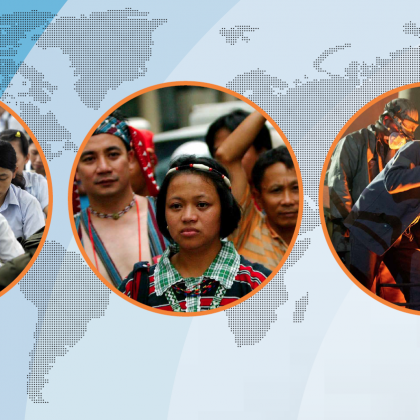Sustainable Finance and the UNGPs: towards a grievance mechanism for victims of climate action
Sustainable finance is ordinarily considered a force for good aimed at mobilising financial support for climate action (SDG 13), among other environmental objectives. Notwithstanding, there is an ongoing discourse about the tendency of the sustainable finance framework to cause or contribute to adverse human rights impacts. This piece aims to contribute to the discourse with emphasis on the question of whether and how financial services actors (FSAs) should respond to such adverse impacts. Such a response, if at all, needs to be centred on pillar III of the UN Guiding Principles on Business and Human Rights (UNGPs) and the UN-endorsed human rights-based-approach to the climate crisis. , In particular, the sustainable finance agenda needs to embed a UNGP-compliant grievance mechanism that is conducive to the fulfilment of the right to remedy of victims of sustainable-finance-related-adverse-impacts.
Although based on the idea of factoring in environmental, social and governance (ESG) considerations into lending and investment decisions, sustainable finance could cause or could contribute towards adverse human rights impacts. The sheer volume of financing earmarked for wide-ranging climate action warrants a keen consideration of whether and how sustainable finance-related-adverse impacts should be addressed by FSAs. This consideration is significant at a time when 23 of the world’s 50 largest private sector banks, as reported by the World Resources Institution have made sustainable finance commitments collectively amounting to multiples of trillion dollars as of July 2019. At governmental levels, the EU is at the forefront of global efforts with the EU Sustainable Finance Action Plan alongside the European Green Deal Investment Plan which is expected to mobilise at least €1 trillion of sustainable investments over the next decade.
The urgency of the sustainable finance campaign is perhaps underscored by reports indicating that banks are just as guilty for the destruction of the climate as the fossil fuel companies that they fund. Specifically, the world’s top banks have reportedly allocated at least $1.9 trillion into fossil fuel financing since the 2015 Paris Agreement.
However, the concerns about the sustainable finance framework have included its failure to reflect sensitivity to human rights impacts and perhaps its alleged incompatibility with the notion of a just transition. Indeed, a recent survey of European banking practice concluded that “the idea of ensuring a just transition is generally not reflected in banks’ climate strategies”.
Meanwhile, the report by the Grantham Research Institute on Climate Change and the Environment, stresses the critical role of FSAs in making just transition a reality. The report noted that climate success is contingent a transition that is underpinned by fairness across the socio-economic spectrum.
Climate action and adverse human rights impacts
Climate change as well as adaptation and mitigation strategies to combat its impacts, otherwise known as climate action, have significant implications for human rights and the potential to exacerbate situations of injustice.
This propensity has been witnessed across a broad range of climate actions especially renewable energy projects. The Business & Human Rights Resource Centre identified 152 allegations of human rights abuses related to renewable energy projects between 2010 and 2019 . These range from killings, land grabs and dangerous working conditions to harm to indigenous peoples’ lives and livelihoods. FSAs involved in financing such projects are invariably complicit in the resulting adverse human rights impacts, becoming contributors within the ambit of UNGP 13. In this connection, FSAs are expected to provide or contribute towards remediation of such adverse human rights impacts in accordance with UNGP 22.
The Thun Group of Banks attempted to clarify the issue of complicity of corporate and investment banks for human rights abuses arising from financial services to clients. The Group noted that in accordance with UNGP 13B, banks should “seek to prevent or mitigate human rights impacts that are directly linked to their operations, products or services by their business relationships, even if they have not contributed to those impacts”. The Group clarified that banks need to focus on influencing the actions of their clients to provide or contribute to remediation for rights holders.
Indeed, there seems to be little, or no attention paid by FSAs to the collateral impact of climate action on communities and indigenous peoples and how to remediate this. This gap reflects non-consonance with the provisions of the UNGPs, especially pillar III thereof on access to remedies. UNGP 13 provides that business enterprises have a duty to avoid causing or contributing to adverse human rights impacts and address such impacts when they occur. The commentary to UNGP 13 clarified that business enterprises may be involved with adverse human rights impacts either through their own activities or as a result of their business relationships. Importantly, UNGP 15 noted that in order to meet their responsibility to respect human rights, business enterprises should in addition to human rights due diligence processes, have in place processes to enable the remediation of any adverse human rights impacts which they cause or contribute to.
Other specific international standards directed at FSAs within the present context include the UNEP Finance Initiative Human Rights Guidance Tool for the financial sector as well as OECD Guidance on due diligence for institutional investors and due diligence for the financial sector among others.
Sustainable finance framework and grievance mechanisms
Embedding a grievance mechanism in the sustainable finance framework is imperative as financial institutions respond to growing pressure to shift financing away from fossil fuel investments. FSAs would need to consider integrating grievance & complaint mechanism into their sustainable finance policy framework, perhaps in a manner modelled after Independent Redress Mechanism (IRM) of the Green Climate Finance, the World Bank Grievance Redress Service (GRS) and World Bank Inspection Panel respectively, the Independent Review Mechanism of the African Development Bank (AFDB), and the European Investment Bank Complaint Mechanism.
In the context of climate action, a key example is the Green Climate Finance (GCF) which is the world’s largest climate fund. The GCF consists of an Independent Redress Mechanism (IRM) in acknowledgement of the potential adverse impacts of the GCF funded climate action. The IRM responds to complaints by people who feel they have been adversely affected by GCF projects or programmes failing to implement GCF operational policies and procedures.
By embedding a viable grievance mechanism that enables access to remedies for victims of sustainable finance-related-adverse outcomes, FSAs would potentially be contributing towards a just transition. The grievance mechanism should be based on the seven effectiveness criteria for non-judicial grievance mechanisms prescribed under UNGP 31. This would hopefully result in a win-win situation for both FSAs and victims.
in view of the prospect of addressing such grievances before they escalate and result in avoidable violations giving rise to reputational loss and/or financial loss to the FSAs. For the victims, it would potentially enable quick resolution of grievances at the project implementation stage thus preventing undue legal expenses, and aggravation of the grievances. In any event, it is acknowledged that the UNGPs do not create legally binding human rights obligations for businesses. Notwithstanding, to the extent that a significant percentage of FSAs have declared their commitment to abide by the provisions of the UNGPs, it is expected that their sustainable finance framework would be aligned with the stipulations of the UNGPs particularly pillars 2 and 3 respectively.
Valentine Kunuji is currently a Doctoral Researcher at the Law School, University of East Anglia, UK. His research is primarily focused on Business and Human Rights, International Investment Law and indigenous peoples’ rights.
For more on related topics from the Business and Human Rights Journal (BHRJ) see: ‘The Record of International Financial Institutions on Business and Human Rights’ and ‘Climate Change as a Business and Human Rights Issue: A Proposal for a Moral Typology’






thank you for the information, very useful